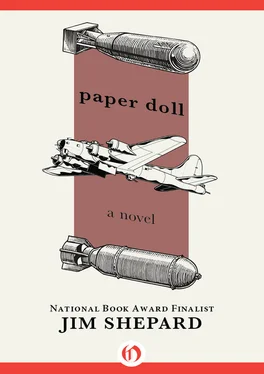Bryant was up onto the platform behind the pilots’ seats and through the passageway to the bomb bay catwalk, squeezing past the narrow V-shaped support beams in his fat flying jacket like a child desperate to get through some bannisters. In the radio room Bean had climbed onto a box, an ammo crate, to get better tracking angles for his gun out of the slanted overhead window. He took off his mask in alarm when he saw Bryant, his face painted with brass dust above the mask line from the cartridges and so much firing. He pointed at the bailout signal as if to indicate he hadn’t seen it and Bryant shook his head, and indicated Bean’s walk-around bottle and the hatchway to the waist. They stepped through it, Bean following.
The waist was empty. Cold air was blasting through an open hatch, and they hunched in the narrowed cylinder of this tapered part of the fuselage and pointed for each other at the escape door, which had been jettisoned. Piacenti’s and Ball’s oxygen masks were still plugged in and hung floppy and inverted along the wall, like bats.
He connected his interphone at Piacenti’s station to tell Gabriel, and Lewis already had, having called in their desertion after the chutes had streamed out past him. Lewis was still cursing and Bryant took the earpiece from his ear for a moment. “Both of them?” Gabriel was asking.
Lewis said something about that filthy wop bastard and his pal. Snowberry broke in in explosive bursts when his call button could override Lewis’s and gasped and made noises impossible to interpret. Lewis said, “Bryant, are you checking on the kid?”
Bryant and Bean moved with peculiar and mechanical quickness, shoulder to shoulder, the seals of their masks trembling. They hunched over the ball turret and hand-cranked it around to position the exit door inside the fuselage, and yanked it open. Blood sprinkled upward from the change in pressure.
“He says he’s gonna puke,” Gabriel called. “Get his mask off.”
They pulled him out and he seemed to uncoil raggedly from the tiny sphere. Bean was lifting weakly under his shoulders and Bryant tore off Snowberry’s mask, the vomit looping and threading from his face. His head was moving from side to side and he slapped at his thigh. His pant leg was badly holed at the knee like a boy’s old pair of jeans, and beneath the dark and soaked edges of sheepskin the kneecap slid free and flapped like the lining of a pocket.
Bryant felt his stomach rise and squeezed his hand over his mask. Bean had not slowed and seemed to be systematically checking him. His left hand was smashed and the glove was flat and mangled. Blood scattered in cold and coagulating droplets wherever he’d been, wherever he gestured. He coughed and choked and brought his good hand to his mouth to clear away the mess. Blood flecked and painted Bean’s goggles.
They stuffed a blanket between his head and the bulkhead and wrapped his feet in another. Blood dripped from his nose and he looked childlike. He was whispering something and they both looked at his parachute, hacked by shrapnel. He whispered and they understood it had to be, Don’t leave me here, and Bryant shook his head, twice, to indicate they wouldn’t. Bean cupped his chin and Bryant wiped his mouth and they hooked him into Piacenti’s air. Bean’s gloved fingers sorted through the first aid kit. Blood bubbled and froze around the seal of Snowberry’s oxygen mask and Bryant scraped at it with the double-seamed fingertips of his gloves. Bean laid the morphine syrette on the tumble of the blanket and exposed the wrist of Snowberry’s good hand and gestured for Bryant. Snowberry’s head thumped the bulkhead in pain. Bean held the wrist as level and as still as possible. Bryant jabbed it with the tiny needle, anywhere. Snowberry jerked, as though that had been the worst of all.
He tried to remember what else was necessary. Bean had clearly moved on to the knee. He remembered bored NCO’s modeling splints and neat bandages in training lectures. He had Snowberry’s flight jacket zipped open and could see a soaked area the size of a baseball on his left side. He looked at Bean and Bean looked back helplessly, his gloves under his arms, his hands in the wet of Snowberry’s knee. Paper bandages flew from the kit. Bryant found some cloth, bunched and folded, and eased it onto the spot. He held it there until Bean lifted it from his hands and set it aside and moved to expose the wound with a surprising and gentle assurance. Snowberry’s knee was already wrapped, poorly but vehemently.
Bean gestured to the ball, and Bryant understood. In the hatchway to the radio room, Cooper, too, was pointing at the ball. They were taking additional hits, and he saw a pattern of daylight through the fuselage, a magical and artificial Big Dipper.
He removed his parachute and climbed gingerly into the hatch, his rear dropping low, his legs spreading and curling upward into the gun charging stirrups. He didn’t fit completely, and the contortion was painful on the back of his neck and his hamstrings. He felt Bean close the hatch door behind him, heaving the metal door shut against the pressure of Bryant’s back.
He got his hand on the rotation mechanism and swung the turret around so that he was curled more or less upright, head and feet up, rear down. He sighted out a circular Plexiglas panel between his legs. He adjusted the reticles of the gunsight for range with a left foot pedal. Tracking and firing involved the same grip handles as the dorsal, above his head instead of in front of him. The jetstream whistled through jigsaw holes along his left side, and below and beside one leg, like paint, he had to contend with a large frozen smear of blood, hampering visibility. His knees flanked his ears. His fingers and eyes moved along the guns on either side of him, checking for damage. A fighter swam up over his crotch from the world below, lining up for a free pass at their underside. He swiveled and aligned the shot delicately and let go a burst that surprised the German pilot but was too low. The sky cleared a little and he experimented, to get the hang of the turret’s play. The rotation mechanism seemed more sensitive than the dorsal. He plugged in the interphone. Something else passed by and he fired at it, unused to the way the targets appeared so quickly from his blind spot above, and the cartridge cases tumbled and spilled over him. When he could, he slid them out the slots for the gun barrels.
A straggler trailing smoke thousands of feet below and behind them was swept over by a swarm of single- and twinengine fighters, the spurts and blips of hits at that distance registering all over the wings and fuselage. All four engines caught fire and the plane broke up gently and silently into smaller pieces.
“We got manifold pressure problems in the number two engine,” Gabriel said. Bryant could feel the shaking, their engine trying to tear itself out of the wing. They’d have to shut it down, but with only two engines left they weren’t going to keep up with the formation. The shaking stopped, and he could feel the airspeed drop.
Behind them twin-engined Me-110’s trailed along out of range with the intention of executing stragglers. They had a choice in Paper Doll of bailing out or hitting the deck, trying to get back flying the lowest possible altitude, hedgehopping home.
Gabriel asked for a vote.
“Our waist gunners already voted,” Lewis said.
“I’m asking you guys,” Gabriel said. “Our navigator’s gone so I don’t know exactly where we are. But it ain’t friendly.”
Bean was not on the system; still treating Snowberry, Bryant assumed. Bryant said, “I say we stay. Snowberry’s chute is bad news. He won’t survive a jump, anyway.”
Gabriel waited. The plane was falling back now, and Bryant imagined Archangel and Plum Seed leaving them behind, the tail gunners in each regretting Paper Doll ’s misfortune.
Читать дальше












